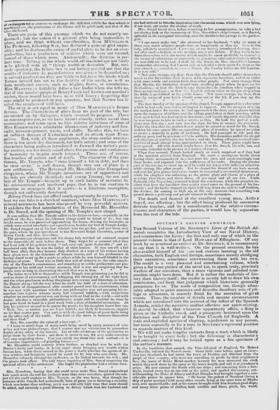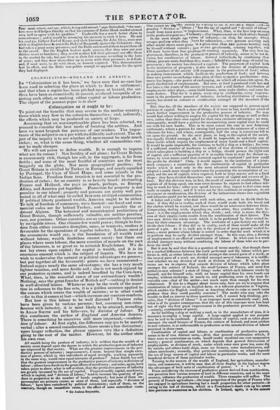SOUTHEY'S BRITISH ADMIRALS.
THE Second Volume of Dr.. SOUTHEY'S Lives of the British Ad mirals completes the Introductory View of our Naval History, and commences the Lives ; the first and only one of which in the present volume is that of Lord HOWARD of Effingham. Of any work by so practised an author as Dr. SOUTHEY, it is unnecessary to say that it is well-written. On the present occasion, he has
also availed himself of his tare and curious learning in the old chronicles, both English and foreign, sometimes merely abridging their narratives, sometimes interweaving them with his own.
The result is a very pleasant and entertaining volume, which gives a far truer picture of the naval (or, to speak truly, piratical) warfare of our ancestors, than a more vigorous and polished com
position might have done. But it is rather the materials of history than history itself : the reader is mostly left to draw his own
conclusions, and form that judgment which historians generally pronounce for us. The mode of composition too, though admirably adapted to paint manners and describe desultory acts of pillage or adventure, is scarcely fitted for the narration of gnat events. Thus, the number of details and minute circumstances which are introducedinto the account of the defeat of the Spanish Armada, render the narrative neither effective nor spirit-stirring.
It should be added, that whenever opportunity offers, a fling is given at the Catholic creed, and a panegyric bestowed upon the doctrines and discipline of the True Church (of England). A stale and exploded species of claptrap, injudicious in any person, but more especially so for a man in SOUTHEY'S equivocal position as regards matters of this kind. We will not make lengthy extracts from a work which is likely to be bought by every body; but the following is characterist c and amusing ; and it may be looked upon as a fair specimen cf the authois manner.
In the hostilities that ensued, the Vice-Admiral of England, Sir Robot Umfreville, infested the Scotch coast. Some little time before upon an incursion into Scotland, be bad burnt the town of Peebles, and obtained from the
people of that country, who were not unwilling to profit by their neighbour's
loss, the name of Robin Mend-market, because his men measured the cloth which they took there by, the spear or the bows-length, and sold it at plunderer's price. He now entered the Forth with ten ships; and remaining there a fortnight, landed every day on one side or the other, and spoiled the country, notwithstanding the Duke of Albany and Earl Douglas had brought together a considerable power to oppose him. "He burnt the galleot of Scotland (being a ship of great account) with many other vessels, lying at the same time at Blackness, over against Leith ; and at his return brought with him fourteen good shim and many other prizes of clothes, both woollen and linen, .pitch, tar, .wood,
tour meal, wheat, and rye, whieh, being sold abroad." says Holinshed, "the markets were well holpen thereby, so that his surname of Robin Mend-market seemed very well to agree with his qualities." Umfreville has a much better claim to remembrance; and it would be wronging his memory to omit it here. He and his nepl ew, Gilbert Earl of Kyme, and their kinsman, Sir John Gray, were sent with an English force to assist the Duke of Burgundy against the Orleanists : they kad taken a great many prisoners, and the Duke commanded them to put them all to the sword. But the English leaders made answer, that they were not sent thither to act as butchers ; they would neither kill their prisoners nor offer them in the market for sale, but put them to their fair ransom, according to the laws of arms ; and they drew themselves up in array with their prisoners, to defend, and, if need were, to die with them, as honour required. This determination hail its effect, and the Duke was politic enough to applaud them for the spirit they had displayed.





















 Previous page
Previous page